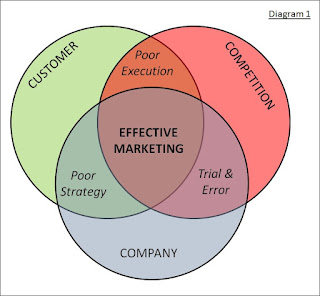STRACOMP: The Most Ignored Thinking in Marketing
R.C.
Natarajan
Over half a century ago, when Jerome McCarthy gave the much
famed 4-Ps of Marketing, academicians and practitioners thought alike thought that
they had cracked the code and mastered the field. However, it did not
substitute the basic concept of marketing, coined as 3-Cs, the Customer, the
Competition and the Company. (Diagram 1)
Then came Jag Sheth’s 4As of Marketing in early 21st
century. Unfortunately, very few understood that Sheth was propagating a
complementary model to McCarthy’s and not a substitute. Whereas the 4Ps
framework focuses on what the organisation does to get its positioning in
consumers’ mind right, the 4As model focuses on how the consumer perceives
about the product. (Diagram 2)
It is critical
to understand that while Acceptability and Availability are critical factors in
positioning mix, Awareness and Affordability
are intermediary factors. (See Diagram 3).
STRACOMP Framework
While the 4Ps
and 4As frameworks relate specifically to the segment-product-competition
context, STRACOMP framework incorporates the company both from a long-run
perspective and from permeation through other departments.
STRACOMP is an
acronym for STRAtegy, COMmercial and P&L. A company’s activities can be broadly divided into these
three categories. As Peter Drucker said, “Business is marketing”, and if we view the role of a CMO as integrating
these three, then the picture emerges somewhat as shown in this diagram. This
is quite different from the basic 3C-framework in that the STRACOMP framework
focuses on the broad functional dimensions of an organisation. (Diagram 4)
Whereas the
elements mentioned under each factor may not be comprehensive, they broadly
capture the meaning of each classification. Most of the companies invariably
view the role of Marketing as Commercial, much less Strategic and even less
Companywide P&L function. (Whitler & Morgan, 2017, July. HBR). This sense of working in silos
makes all the three aspects, namely Strategy, Commerce and P&L suboptimal
in themselves and the enterprise as a whole becomes less effective. The
effective enterprise, on the contrary integrates all the three aspects of
business well as shown in the next diagram, leaving no scope for sub-optimality
shown therein. (Diagram 5)
When the
enterprise alienates P&L focus from Marketing, the natural outcome is low
Return on Marketing Expenditure (ROME).
When the
enterprise alienates Commercial functions from Marketing (which is most
unlikely), the result is a grand plan on paper without any execution.
When the
enterprise alienates Strategy from Marketing, it loses crucial battles against
competition and thus loses markets.
Thus, we now have
four frameworks from which effectiveness of marketing has to be assessed.
- The 3Cs Framework
- The 4Ps Framework
- The 4As Framework, and
- The STRACOMP Framework.
Understandably,
no single framework can be a panacea. In a given context, one framework or a
combination of frameworks may suit the purpose better than the rest.
= = = = =
.






This given an entirely new approach to view the marketing department in an organisation
ReplyDeleteThis blog needs to be a part of curriculum of all Business Schools. Also, it should be circulated as a memo in corporate offices of all FMCG organizations. R. C. Natarajan Sir Totally worth it!
ReplyDelete